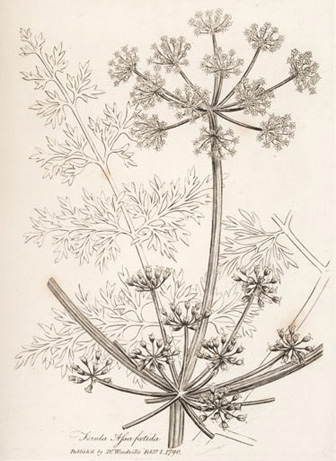Asafoetida Ferula foetida
From An Herbalist in the Kitchen

Illustration from:
Woodville, William. Medical botany: containing systematic and general descriptions, with plates, of all the medicinal plants, indigenous and exotic, comprehended in the catalogues of the materia medica, as published by the Royal Colleges of Physicians of London and Edinburgh: accompanied with a circumstantial detail of their medicinal effects, and of the diseases in which they have been most successfully employed... .
Volume 1 of 4. London: Printed and sold for the author by James Phillips, 1790-1793.
Courtesy of the Rare Book Collection of the Missouri Botanical Gardens.
Other Common or Ethnic Names
- Asafoetity, Asafedity, Assafedity, Divel's Dreck, Fetty, Fidity, Food of the Gods, Hing, Metath, Stinking Gum
- It has been listed botanically, as Asafoetida nartex, Ferula asafoetida and Narthex assafeotida.
- Burma/Myanmar: Sheingho
- Estonia: Asafootida
- Germany: Asant, Stinkasant, Teufelsdreck
- France: Asafetide, Assa Foetida, Ferule Persique
- Iceland: Asafoetida
- India: Anjadana, Ingu, Inguva, Hengu, Hing, Hingu, Kayam, Perungayam, Perunkaya, Raamathan
- Iran: Retshina Fena
- Italy: Assafetida
- Netherlands: Asafoetida, Duivelsdrek, Godenvoedsel
- Norway: Dyvels Drekk
- Russia: Asafetida
- Spain: Asafetida
- Sri Lanka: Perunkayan
- Swahili: Mvuje
- Sweden: Dyvelstrack
Related Species
- Ferula communis: Common Giant Fennel. A weed indigenous to the Eastern Mediterannean area. This is not the familiar edible Fennel (q.v.).
- Ferula narthex: Asafoetida
- Ferula gummosa: Asafoetida
- Ferula scorodosoma: Asafoetida
- Ferula galbaniflua: Galbano (Italy and Spain); Galbanum
- Ferula sumbul: Sumbul Root
Growth Habits
Perennial
Origin: Afghanistan and Iraq
Range: Sandy deserts
Culinary Uses
Nasty-smelling almost beyond belief, Asafoetida has somehow found its way into a number of cuisines. In small amounts (like musk) it lends an intriguing, exotic quality to foods. Fortunately, it loses its pungency when cooked.
The resin, made by drying the plant's milky sap, is used in India and Iran to flavor curries, meatballs and pickles. The achars, or mixed hot pickles, of India are often laced with Asafoedita. While it is popular among Hindus in Kashmir, it is never used by Moslems.
Ferula foetida, Ferula narthex, Ferula narthex, and Ferula scorodosoma all yield the resin commercially.
It was used in Classical Rome--it may be that our Worcestershire Sauce is a descendent of those ancient Asafoedita-laced concoctions.
The entire plant is used as a vegetable.
Asafoetida's foul pungency results from Diallyl Sulfide, as well as a number of other sulfur compounds that are closely related to those responsible for Garlic's antisocial behavior. It also contains a-Pinene and Phellandrene.
Galbanum yields a floral-scented oil that is used in baked goods, candies and ice creams. It contains Myrcene, Cadinene, d-a-Pinene, b-Pinene and several Sesquiterpenes.
Other Uses
People used to tie little bags of Asafoetida around their neck to ward off winter diseases. It is hard to imagine life in a time when running water was unavailable, people sewed themselves into their long johns for the winter, and then chose to adorn themselves with Asafoedita. It probably worked -- since the chances of exposure to communicable disease were probably pretty light!
The resin, after a steam treatment to remove some of its more unsavory aromas, is used as a fixing agent in perfumes.
Comments
Save yourself a truly unpleasant experience: if you find a store that carries Asafoetida, resist the temptation to smell it for yourself. Asafoedita was known to the ancients as Stercus Diaboli, the devil's own excrement. Enough said?
Other than Ferula communis, none of these species are listed as growing in North America, according to Hortus Third. This could mean that they are not grown here, Hortus doesn't know that they are grown here, or that the species names are incorrect.
